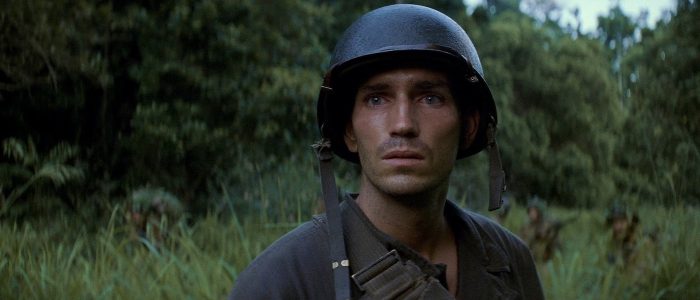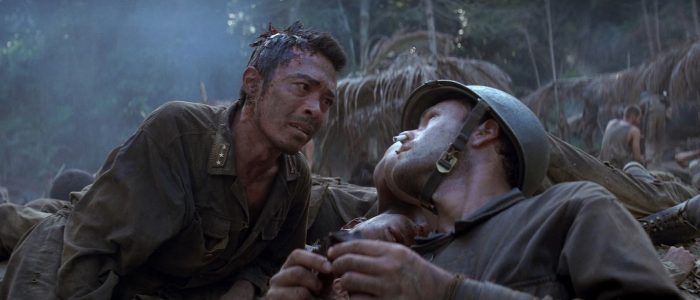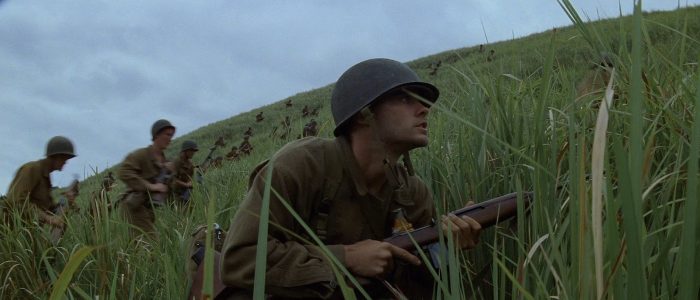20 Years Later, Terrence Malick's 'The Thin Red Line' Retains Its Poetic Grandeur As One Of The Best '90s Films
If the definition of an auteur is a director whose authorship is self-evident from their signature filmmaking style — so much so that you could theoretically identify their movies without seeing a name credit — then Terrence Malick is a winning candidate for the title. Left unchecked, Malick's style of whispery voiceovers and immaculately framed nature scenes can be overbearing. In recent years, he's fallen out of critical favor, earning increasingly mixed reviews ... in direct proportion, it would seem, to how newly prolific he's become.
Since the late-career peak of The Tree of Life in 2011, Malick has raised his output significantly, releasing a swift succession of films. Some have accused those films of playing as little more than extended cologne commercials, with movie stars cavorting to classical music. There was a time, however, when a Terrence Malick film was more of an event, one that might only come along once every two decades. After helming two landmark New Hollywood films in the 1970s, Badlands and Days of Heaven, Malick did indeed go on hiatus for twenty years.
We are now another twenty years removed from his comeback film, the star-studded World War II epic, The Thin Red Line. Backed by an all-time great Hans Zimmer score, the movie went into limited release in late December 1998. The years have not lessened the effect of its visual poetry. This is a motion picture that plays like a prayer, probing the duality of the human spirit, showing the struggles of numerous characters as the war and Mother Nature play out indifferently around them. Martin Scorsese was right: it's one of the best films of the 1990s.
The Thin Red Line is a movie rife with symbolism. It opens with the image of a crocodile submerging itself in murky green water. As the cold-blooded reptile sinks its head below the surface, the music swells and we transition into a different scene, with light filtering in through treetops as a folksy voiceover asks, "What's this war at the heart of nature?"
It's a layered question, which could just as easily be talking about human nature. Throughout the movie, we'll see multiple juxtapositions of people against an environment that is both beautiful and harsh. Before it's over, triumphant soldiers will gather around the subdued crocodile, as if they have a brief handle on their soul of aggression only because they've been able to assert their dominance over the landscape and their fellow man.
The setting is Guadalcanal, where warships intrude on an earthly paradise populated by singing natives. It's here that we meet the AWOL Private Witt, played by Jim Caviezel. Witt is the closest thing that the movie has to a main character.

This was a breakout performance for Caviezel. A few years later, he would play Jesus in The Passion of the Christ. Here he's relegated to the role of the resident Christ figure in his infantry unit.
That's not an idle comparison. Reflecting on the "calm" that his mother demonstrated on her deathbed, Witt seems to take that energy into himself. After he leaves behind his slice of island heaven and returns to hard duty as a stretcher bearer, he himself becomes a calming, Christlike presence among his fellow soldiers. The movie depicts him easing the suffering of wounded infantrymen, seeing a spark of good in even the most jaded individuals, and ultimately, laying down his own life in a final sacrifice to save the men of his unit.
It's a sure bet Malick has read The Grapes of Wrath (which was likewise the subject of a classic motion picture) because Witt also lifts a direct quote from the humanist gospel of John Steinbeck's novel. That line where he says, "Maybe all men got one big soul ever'body's a part of," shows Witt to be haunted by the ghost of Jim Casy, whose initials, like Jim Caviezel's, match those of a certain religious figure ...
Apart from Caviezel, the sprawling ensemble cast of The Thin Red Line reads like a who's who list of established stars and up-and-coming actors of the turn of the millennium. Some of them, like John Travolta, Thomas Jane, and George Clooney, only appear in one scene. Others, like Tim Blake Nelson, Adrien Brody, and John C. Reilly, had their roles greatly reduced, to the point of being minor characters. Still others, like Sean Penn, Nick Nolte, Woody Harrelson, and John Cusack, sink into roles where their star power feeds their clout as officers.
Other familiar faces include Jared Leto, John Savage, and Nick Stahl. The latter two would go on to play father and son in the HBO series Carnivale, which recycled Zimmer's "Journey to the Line" composition, much like the trailer for Pearl Harbor and several other high-profile movie trailers did.
Malick has a nose for talent; he's a veritable bloodhound for future stars. In his films, however, it's frequently the lesser known actors who make the biggest impression. Think of Linda Manz, the young narrator of Days of Heaven, or Q'orianka Kilcher as Pocahontas in The New World. The Thin Red Line is similar to those movies in that some of its most impactful characters are played by actors whose names the uninitiated might have to look up on IMDb.
Arie Verveen plays Private Dale, who sticks cigarette halves in nostrils and collects teeth from the war dead until the lingering words of a Japanese POW hit him during a rare moment of introspection in the rain.
There's also Dash Mihok's Private Doll, who steals a handgun and gets excited about making his first kill, only to be immediately confronted by how little his big moment really matters in the grand scheme of things.
Though he co-starred the same year in films like Fallen and Apt Pupil, Elias Koteas was probably best known to '90s kids for playing Casey Jones in Teenage Mutant Ninja Turtles. Yet his character, Captain Staros, has one of the most affecting arcs in the film.
Staros isn't well-respected by his men, but he doesn't want to see them die needlessly and will disobey a direct order — thereby imperiling his own status as an officer — to save them. He and his irate superior, Colonel Tall, played by Nolte, are both afforded closure and a ceremonious exit from the film. That sort of neatness feels like something that the disjointed Malick narratives of the 2010s would be less inclined to offer.
Ben Chaplin lends poignancy to his subplot as Private Bell, who is sustained through the wartime madness by remembrances of his wife back home. Lord of the Rings fans might recognize the wife as Miranda Otto. Here, she takes on an angelic glow, mirroring other women Malick has framed in the natural light of window curtains.
The Thin Red Line takes us into Bell's mind, letting us hear and see his thoughts and flashes of memory. Other characters receive the same treatment. The movie's shifting perspectives amount to a god's-eye view of individual lives posed against the tapestry of war, where man's inhumanity to man rages on. Hence Savage's shell-shocked prayer leader muttering to God, "Show me how to see things the way you do."
As if to emphasize the universality of the human experience, it's not even clear at all times who's speaking during The Thin Red Line's many voiceovers. Some of them come from a character named Train, played by an unknown actor named John Dee Smith, who only appears on-screen a couple times to bookend the soldiers' time on the island. Even if you've got the closed captioning on, the sight of Train's name as his disembodied voice carries on might leave you thinking, "Wait a minute, which one is he?"
Malick's last film, Song to Song, had a moment where it seemingly cut at random to a butterfly flapping its wings. It might strike some as self-indulgent, but The Thin Red Line finds purpose in moments like that. On the battlefield, blades of tall grass undulate in the wind, revealing hidden snakes and dying birds, as American soldiers push up a hill guarded by Japanese machine gun bunkers.

These images are no more abitrary than that of the crocodile. Compounding themselves like metaphors in a poem, they live in service to the greater theme of Earth's savagery, both the danger it holds for us and the ruin humankind's violence inflicts.
At times, the conflict plays out absurdly, with men literally having their backsides blown off by grenades. This senselessness extends beyond the battlefield to the private struggles soldiers endure. The scene where Bell wanders off after receiving a Dear John letter from his wife would have made a fitting curtain call for his character, but life goes on and when we see him again, he's forced to carry on as a supporting player despite the trauma of spousal abandonment.
One thing that sets The Thin Red Line apart from the silent-film mentality of more recent Malick films is that it actually gives its scenes room to breathe and contains some meaningful dialogue exchanges. The movie juggles copious subplots, but there's a fairly logical progression of scenes. Lyrical though it is, it's not just an endless montage of scattershot moving pictures.
The dialogue scenes between Witt and Penn's character, Sergeant Welsh, form the philosophical backbone of The Thin Red Line. Witt is the idealist who looks to the heavens but must face the reality of the war tainting even the local Melanesian village where he took sublime refuge at the movie's start. Welsh is the materialist—not in the sense of valuing possessions, but in the sense of believing in pure matter: this world, this rock.
He only gets lonely "around people." Cut off from others by the callus of bitterness that has formed around his weary self, Welsh espouses pessimism about the good that any one person can do. This is typified by his early line: "In this world, a man himself is nothing. And there ain't no world but this one."
All the while, however, Welsh copes with the unanswered pain he sees in the world by clinging to a kind of existentialist outlook. Since nothing matters, a man like him can only keep his head down and "make an island for himself." The movie recognizes his viewpoint but uses Witt as a foil to illuminate the unseen glory that might be out there, trafficking with overlooked birds in the sky.
There's an old quote that goes, "Be kind, for everyone you meet is fighting a hard battle." The Thin Red Line remixes that into the poster tagline, "Every man fights his own war." Using the war and nature as a vast canvas for exploring the interior life of individuals gives this movie an intimacy and power that renders it unforgettable.
